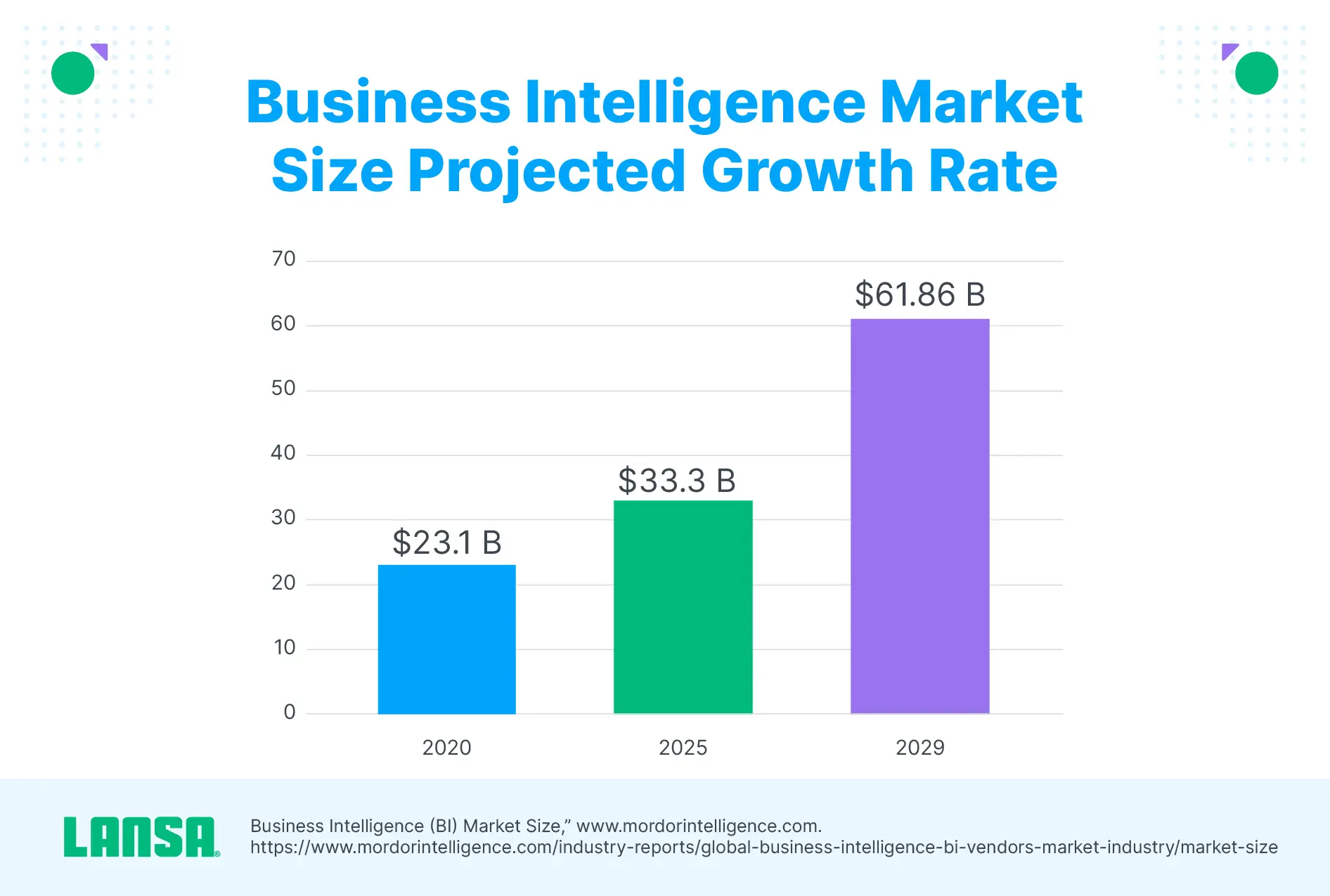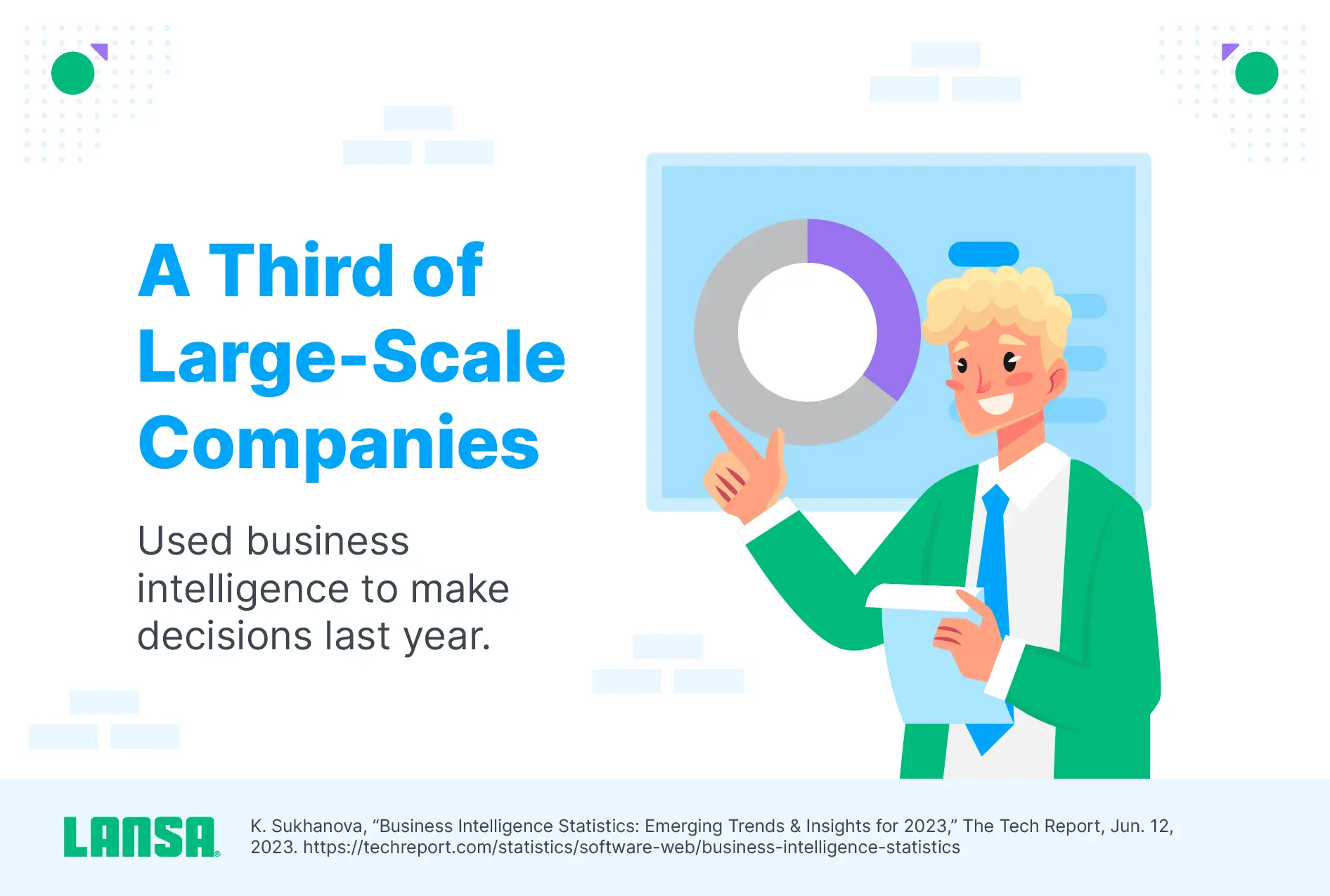The benefits of business intelligence for modern-day, digitally-dependent organizations cannot be overstated. Business intelligence is a critical component of strategic management and strategic planning. Companies that can successfully integrate business intelligence into their operational workflows have a distinct advantage in today’s technologically competitive business environment.
Data-driven insights can help take the guesswork out of business decision-making by providing stakeholders with a foundation based on practical evidence rather than isolated anecdotal details. The benefits of business intelligence are numerous, and companies have an easier time meeting their business objectives when they base decisions on factual information rather than elusive business intuition.
Chaotic economic conditions brought about by the COVID-19 pandemic prompted businesses to double down on the importance of data and prioritize it during the uncertainty that surfaced in the subsequent years. According to a study by Harvard Business Review, 81% of executives surveyed said their companies increased their investment in data and analytics initiatives post-pandemic. [1]
In this blog, we’ll provide you with ten business intelligence benefits that can help ensure your business’s success. We’ll start by exploring what business intelligence is and delve further into the benefits it offers. We’ll also cover just exactly how LANSA can support your business intelligence goals.

Key Insights
- Starting off right: The data pre-processing phase is a very important component in ensuring data is error-free. Business intelligence tools ensure that the data is enriched properly, particularly for missing values.
- Improve your decision-making: Leverage a BI tool for maximum benefit to your business’s bottom line through cost-savings and efficient resource allocation.
- Immediate action: Simplify your organization’s decision-making process with the visually appealing, accessible business intelligence dashboards that BI tools provide.
What Is Business Intelligence (BI)?
Business intelligence describes the approach organizations take to collect, use, and analyze raw data for the purpose of supporting stakeholders’ decision-making efforts by providing them with actionable insights.
Business intelligence tools include multiple components, including descriptive analytics, predictive analytics, data mining, data warehousing, and data visualization in the form of dashboards and reports. The advanced predictive analytics capabilities that are modern enable organizations to make more informed predictions and strategic decisions.
The full benefit of business intelligence results, when companies take full advantage of all that BI, has to offer.
10 Important Benefits of Business Intelligence
Increased Data Quality
Business Intelligence improves data quality. BI tools help to filter out inaccuracies in data at the pre-processing phase. Real-world data can be very messy. There are always gaps in data, and filling those gaps requires a skillful approach. One of the benefits of business intelligence software is that these tools help to ensure imputed data values are realistic and in line with historical trends by using several mechanisms including advanced algorithms and pattern recognition.
Lower Costs
Business intelligence tools facilitate informed decision-making. BI tools can determine if resources are allocated efficiently, optimize the scheduling of staff members, and secure discounts on purchasing by analyzing past purchasing patterns and sourcing strategically. By leveraging accurate and comprehensive data, companies make fewer mistakes that would trigger the need to revisit key decisions. As a result, they save time and money. These savings are particularly helpful for small and medium enterprise owners.
Faster Decision Making
Business intelligence analyzes large volumes of data and produces actionable insights. The end benefit is faster decision-making due to the consolidated view of data. Additionally, real-time analytics in BI tools facilitates quick decisions because there is no lag waiting for important reports to come hours or days later.
Data visualization results in quicker decisions because a visual representation of data allows team members to identify trends very easily. Predictive analytics takes decision-making to a whole new level. Businesses can make immediate decisions based on predictions rather than wait until events occur and have to make reactive decisions at that time.
Enhanced Productivity
BI tools offer dashboards that centralize key information in one main area. This improves productivity by allowing team members to immediately interact with the data and have multiple reports right at their fingertips. This productivity boost is one of the most notable benefits of business intelligence. BI tools offer automated reporting. In one recent study, an overwhelming majority of workers agreed that automation solutions increased their productivity. [2]
Improved Data Integration / Access
BI tools ultimately improve data access. Teams spend an excessive amount of time overcoming the obstacles created by data scattered across multiple silos. The time spent trying to integrate siloed data can be utilized better by focusing on leveraging data insights. Would you rather your team members spend valuable time trying to access and integrate data? Or would your organization be better served by immediately being able to dive right in and start identifying valuable data insights?
BI systems consolidate data across disparate sources, allowing team members and business executives access to data regardless of technical skill level without needing to constantly bridge data gaps in legacy systems.
Accurate Reporting
Business intelligence lies at the center of accurate reporting. Increased data quality leads to more accurate reporting. BI solves the issue of siloed data that often includes discrepancies. BI systems create a single source of truth by unifying data across disparate enterprise databases and other repositories. Business leaders can leverage BI tools such as standardized BI reporting, which makes it easier for them to compare and analyze data.
Informed Business Decisions
BI tools are capable of informing key team members about which decisions can lead to beneficial outcomes. BI systems are able to make predictions that are more accurate and provide organizations with insight into how the market might respond to those decisions. For example, OLAP (online analytical processing) is a vital component of BI systems and surfaces trends and patterns that humans can’t easily detect. This insight is especially beneficial when deciding on whether or not to pursue the creation of a new product to stay relevant against competitors.
Trend and Business Insights
BI tools help businesses analyze customer data more robustly, which allows businesses to understand why customers behave the way they do. The tools surface trends in consumer behavior that companies can use to create more effective marketing strategies and improve customer experience.
Identify New Opportunities
BI helps companies identify new opportunities for growth and development. BI can surface important customer insights. Companies can create new product offers to identify unmet customer needs. BI offers competitive analysis through performance benchmarking. As a result, your business can fill those gaps in the market before your competitors. Additionally, BI can help businesses discover new ways to optimize their supply chain or identify suitable strategic partners.
Increased Customer Satisfaction
Companies can use BI tools to analyze customer behavior and preferences. Based on the insights they derive, they can create more personalized customer experiences with the end result being more satisfied customers. Additionally, a benefit of business intelligence is improved responsiveness. By monitoring customer behavior and feedback in real-time, companies can quickly respond to customer concerns.
Why do Companies use Business Intelligence Solutions?
Data is widely available now more than ever, and it’s at the center of all modern-day business decisions. An abundance of data is the default, but what businesses do with that data is the key driver behind improved business decisions. BI tools help businesses get a handle on data cleansing and validation, so they can be confident that their reports and analyses are based on high-quality, accurate data.

How Can LANSA support your Business Intelligence Goals?
LANSA BI can help you integrate BI into your IBM i applications. Using LANSA BI, your organization can automate data processing and reporting, easily access data and analytics, and create interactive dashboards to improve collaboration between team members, stakeholders, and other business executives.
Companies that have relied on LANSA’s product offerings have experienced numerous benefits, including increased market share, strengthened customer relationships, and achieved more competitive pricing, to name a few.
Conclusion
If you were previously wondering, what are the benefits of business intelligence, they should be clear and demonstrable by this point. BI tools equip companies with numerous advantages to help them gain a competitive edge. Business intelligence is important for long-term success, and companies who understand the importance of data-driven insights will emerge ahead. Actionable BI can be accessed by IBM users through LANSA BI and help companies proactively shape their future. Lead your organization in taking the next step in integrating business intelligence into your IBM i applications and register for this webinar today.
References
[1] Transforming Data into Business Value through Analytics and AI, Harvard Business Review, 2023
[2] How Automation Drives Business Growth and Efficiency, Harvard Business Review, 2023










